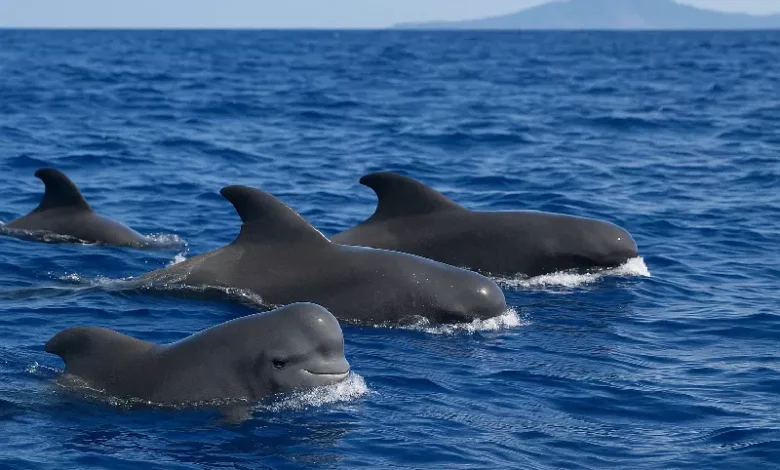Short-Finned Pilot Whales

The short-finned pilot whale (Globicephala macrorhynchus) is one of the most commonly encountered cetaceans off the coast of Dominica. Known for their intelligence, strong social bonds, and impressive diving skills, these whales are a frequent highlight for marine mammal observers and whale watching tours. Their presence in Dominican waters reinforces the island’s global reputation as the whale watching capital of the Caribbean.
Habitat and Distribution of Short-finned Pilot Whales in Dominica
Short-finned pilot whales prefer warm tropical and subtropical seas and are typically found in deep offshore waters. In Dominica, they are most frequently sighted along the west coast, particularly between Scotts Head, Soufrière, and Colihaut, where the seafloor drops rapidly into deep ocean trenches. These underwater canyons are rich in squid and other prey, making the area ideal for these whales’ deep-diving foraging behaviours. The predictable topography of Dominica’s coastlines provides excellent opportunities for researchers and eco-tourists to observe these marine mammals relatively close to shore.
Social Behaviour and Diving Adaptations
Short-finned pilot whales are highly social, living in stable matrilineal pods of up to 30 individuals. Pods often consist of multiple generations of females and their offspring, with males sometimes moving between groups. The whales exhibit complex vocalisations and synchronised swimming, indicative of strong communication and cooperation. Known for their diving prowess, they can dive to depths exceeding 1,000 meters, often remaining submerged for 10–15 minutes while hunting squid, their primary food source. Their echolocation skills and cooperative hunting strategies make them efficient predators in the deep sea.
Whale Watching Opportunities in Dominica
Dominica is uniquely positioned as a prime destination for observing short-finned pilot whales in the wild. Unlike many other islands, the deep waters around Dominica are accessible just a few hundred meters from shore. As a result, whale-watching excursions offer high chances of encountering these whales year-round. Tour operators such as Dive Dominica and Dominica Water Tours often report sightings, with pilot whales frequently seen travelling alongside dolphins and occasionally interacting with sperm whales. These experiences contribute significantly to Dominica’s nature tourism appeal and offer valuable opportunities for education and conservation advocacy.
Conservation and Marine Stewardship
Although not currently classified as endangered, short-finned pilot whales face multiple threats, including entanglement in fishing gear, noise pollution, and marine debris ingestion. Dominica’s relatively unpolluted waters and limited industrial fishing make it a refuge for many aquatic species, but ongoing efforts are needed to maintain this status. Promoting responsible marine tourism, supporting research initiatives, and strengthening marine protected areas are all critical to ensuring the continued presence of these cetaceans in Dominican waters. Short-finned pilot whales are a flagship species whose well-being reflects the overall health of the marine ecosystem.




